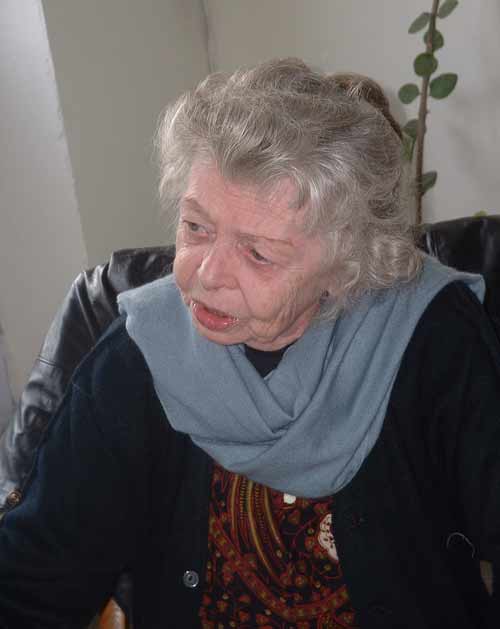SWEDISH SOUTH ASIAN STUDIES NETWORK
Meeting with Nancy Hatch Dupree, Senior Consultant, AKBAR/ARIC (Agency Coordinating Body for Afghan Relief):
 Web
page: www.afghanresources.org
Web
page: www.afghanresources.org
Nancy Hatch Dupree (photo
to the right) is probably the World’s leading authority on
the cultural heritage of Afghanistan, having lived and worked most of
her life in the area. Together with her late husband, the anthropologist
Louis Dupree, she travelled extensively in
Afghanistan in the 1960’s and 70’s and has published numerous
books and articles about the country.
She is now living in Peshawar, and still actively engaged in AKBAR/ARIC
saving whatever there is left to save of the cultural heritage in Afghanistan
after 20 years of destruction and looting.
We were lucky that she had been invited to present a paper
at the Afghanistan Academy of Sciences, so we could meet this fascinating
and enormously vital woman. She came directly from the airport to the
head office of the Swedish Committee for Afghanistan, near Chicken Street
(the SCA office was shifted here as recently as January 2003), where we
had made an appointment in the morning of Thursday 4 December 2003.
Nancy described the main projects that AKBAR/ARIC
is involved with. They involve strengthening the services for research
on Afghanistan, by linking all institutions and libraries in Kabul and
the provinces together. It also involves collecting all possible documents
from the UN agencies, NGO’s working in Afghanistan and multilateral
project bodies. These documents should be made easily available in the
form of a Documentation Centre to be placed in Kabul.
So far 25 000 document have been collected and are now
kept in Peshawar, because still the political situation in Kabul is not
stable enough for the setting up of such a centre. And besides a building,
which should be user-friendly with all facilities available, must be built.
An important benefit such a centre would give is that Afghani researchers
and scholars here would find an arena where they can meet with Western
researcher and students. Because, as Nancy Dupree strongly points out,
it is utmost important that research on Afghanistan is carried out by
Afghanis themselves, and not only by foreign scholars. But in order to
realize this Afghani researchers must be trained in how to handle research.
This knowledge is lacking today.
One institution in Afghanistan where efforts already are under way to
implement this philosophy is the Ministry
of Rural Rehabilitation and Development, where local staff has contributed
to the forthcoming United Nations Development Programme Country Report
on Afghanistan, soon to be published. See the UNDP
Afghanistan Office web page for more information.
Otherwise she has no illusions that it may happen very soon, because the standard of research carried out by local researchers today is not up to the mark. She told an illustrating story that she recently got three manuscripts from local researchers to publish. But it turned out to be impossible to print them, as the quality was too bad. Once upon a time there used to be proficient scholars at the universities, but during the 20 years of war and isolation they have grown old and have given up. And for those who see the salvation in getting young Afghanis, trained abroad, back from the Diaspora, this is not a much better lot, because they mostly lack the knowledge necessary about Afghani culture and society. ”They know everything about technology but lack the human dimension”, Nancy says. This makes them dangerous as they tend to prefer to tear everything old down and put up new buildings.
The second project Nancy Dupree is working hard with is
the so-called ABEL Extension project. It
is about publishing books in the major languages of Afghanistan, Pushtu
and Dari, and distributing them to libraries to be set up all over the
country. Since the project started in 1995 a total number of 122 titles
have been published. Community libraries have been set up at 30 places,
and the distribution also goes to 75 high school libraries, and 600 other
libraries run by other organisations/agencies. Here the Swedish Committee
for Afghanistan is deeply committed in cooperation.
Staffan commented that the mission Nancy Dupree and AKBAR/ARIC has taken
upon themselves should really be a government affair, as it could be termed
setting up a National Archive. Nancy however objected to the term, as
it ”sounds dusty”, and also because the work they perform
could not be carried out by the government at present, because no trained
staff is available. With training it might however be possible to turn
the documentation centre and the libraries over to the government in the
future.
SASNET - Swedish South Asian Studies Network/Lund
University
Address: Scheelevägen 15 D, SE-223 70 Lund, Sweden
Phone: +46 46 222 73 40
Webmaster: Lars Eklund
Last updated
2007-01-18
